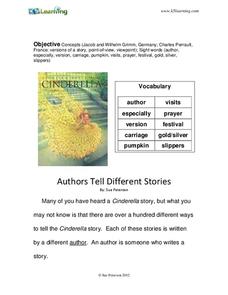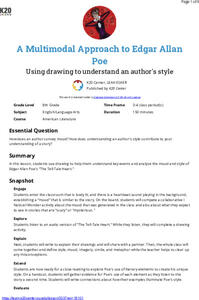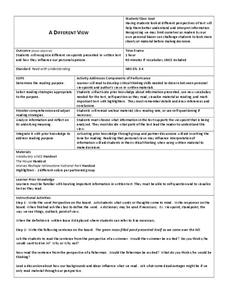Curated OER
Frankenstein
Share a classic novel with your class using this resource. After reading Frankenstein by Mary Shelley, learners answer questions involving the narrator's point of view, make and confirm predictions, and sequence events in the story.
K5 Learning
Authors Tell Different Stories
The story of Cinderella is a popular one! So much so, there are multiple versions of the story being told around the world. With this collection of activities your young readers receive background information about two versions...
Teaching Tolerance
Using Photographs to Teach Social Justice | Confronting Unjust Laws
The right to peacefully assembly to protest injustice is a key element of the First Amendment to the United States Constitution. Class members are asked to analyze two photographs of people confronting what they consider to be unjust...
EngageNY
Introducing The Lost Garden and Finding Evidence of Laurence Yep’s Perspective on What It’s like to Fit into Another Culture on Pages 66– 67 of Dragonwings
How does culture shape perspective? Pupils consider the question as they read an excerpt from Laurence Yep's autobiography, The Lost Garden. Using a graphic organizer, they gather textual evidence and make inferences about the author's...
Curated OER
Desert Views: First Impressions
Students are introduced to primary source material and the ways in which early travelers viewed aspects of the desert environment. The lesson addresses the geography themes of location, region, and human/environment interaction.
EngageNY
Reading for Gist, Answering Text-Dependent Questions, and Determining Author’s Purpose: Industrial Food Chain
A Reading Closely: Guiding Questions handout leads readers to discover the gist of The Omnivore’s Dilemma. While reading, pupils look closely at the words in the text and discuss their meaning. They use dictionaries when needed to answer...
EngageNY
Mid-Unit Assessment: Analyzing Author’s Purpose in Speech and Text
Part one of a mid-unit assessment relating to The Omnivore’s Dilemma includes listening to and analyzing a speech by Birke Baehr. Part two involves analyzing an excerpt from the text. The assessment ends with short response questions.
K20 LEARN
A Multimodal Approach To Edgar Allan Poe Using Drawing To Understand An Author's Style
True! Poe's "The Tell-Tale Heart" makes readers nervous. But how? Young scholars create a drawing while listening to a reading of Poe's eerie tale to understand how writers create the mood of their stories and what their writing style...
Waunakee Community School District
Identifying Themes in Literature
If your language arts learners have a hard time determining the universal theme of a written work, use a straightforward worksheet to help them find it. After reviewing a list of common themes, kids note the title, character, plot, point...
Curated OER
The Two Sides of the Declaration of Independence
Budding historians read six documents related to grievances that led to the writing of the Declaration of Independence. They then craft an essay in which they discuss the perspective of both the colonists and the king. This DBQ could be...
Curated OER
"I" Witness to History
Young journalists write diary entries from the point of view of a person involved in a historical event. They focus on including facts, clear narration, and accurate description of the individual's feelings.
Curated OER
Number the Stars, Lesson 11
Students analyze point of view in the novel Number the Stars. Their writing prompt is how would this chapter(11) be different if Peter were telling the story? Students create a class concept web about pride on the board.
Curated OER
About the Author: Kate DiCamillo
Learners examine the writing process of Kate DiCamillo, the author of "Because of Winn-Dixie." They read author's comments, watch a slideshow narrated by the author, complete a free-write activity, and discuss Kate DiCamillo's top five...
Curated OER
A Different View
Readers need to understand how their personal view point may differ or change how they see the view point found in a written text. Third graders read two informational pieces and fill out a graphic organizer to help them differentiate...
Alabama Department of Archives and History
How Two Alabamians Remembered Slavery Years Later
Designed to help readers recognize the point of view of the author of a primary source documents and analyze how that point of view influences the reliability of a text, young historians examine two personal letters, one written by...
Curated OER
Pet Perspective
Discuss point of view through a familiar medium: your pet! Learners write a story from the perspective of their own or the class pet. Prompts such as "My Family" (or "My Class"), "My Day," and "A Day in the Life of a _________" help...
Curated OER
Stephen Crane's "The Open Boat"
Learners examine the relationship of man and nature as portrayed in Stephen Crane's, The Open Boat." The third person, omniscient point of view, the depth of character analysis found in the story, and the emotions evoked by the author...
Curated OER
Reading For Meaning
Select an article that explores people of another culture. After reading it as a class, distribute copies of this worksheet. It asks for a brief summary, encourages readers to make text-to-self connections, and asks learners to identify...
Curated OER
Lesson: Storyboarding Revolution
Kids consider revolution as a basis for creativity, art, and storytelling. After reading an excerpt from the book, Persepolis, learners choose one event from any world revolution to write about. They storyboard the event focusing on...
Curated OER
The Jacket: Journal Templates Teacher's Guide
Explore this story involving prejudice and racism to enhance learners' comprehension skills. The story The Jacket by Andrew Clements involves an African American boy who is falsely accused of stealing someone's jacket. This teacher's...
Curated OER
Gaining Perspective
Discuss race in the United States. Start by having each learner read a copy of Martin Luther King Jr's famous speech, "I Have a Dream." Then, have them read the article "Shared Prayers, Mixed Blessings" about a church in Atlanta,...
Curated OER
Facing the Ghosts of Our Past
A reading of a New York Times review of the movie Beloved launches research into how the Civil War affected the lives of people living during this period. Creative thinkers select a person from an included list of historical figures and...
Curated OER
A Duck's Bill on Capitol Hill?
Use a list of environmentally related words to engage learners in a discussion about ecosystem conservation legislation. As a class, read "Aware of Political Ecosystem, Property Rights Advocate Embraces Conservation Plan." Then, present...
Media Smarts
Teaching TV: Learning With Television
As part of a series of resources focused on the influence of television, elementary students watch an educational program and identify the information presented and analyze the point of view from which the information is presented.
Other popular searches
- Authors Point of View
- Author's Point of View
- Author's Point of View Media
- Authors Point of View Media
- Author's "Point of View" Media

























